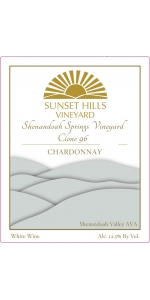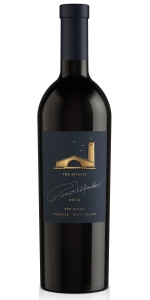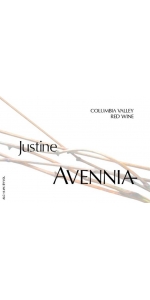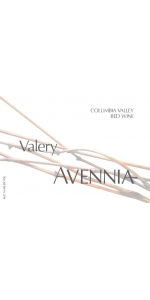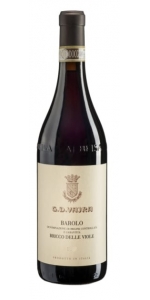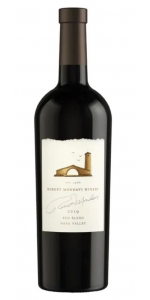Sunset Hills Mosaic Red Blend 2019
| Country: | United States |
| Region: | Virginia |
| Winery: | Sunset Hills |
| Grape Type: | Cabernet Franc |
| Vintage: | 2019 |
| Bottle Size: | 750 ml |
Sunset Hills Shenandoah Springs Chardonnay is made from 100 percent Chardonnay.
This is our first release of a clone-specific wine for Sunset Hills. The goal is to show you a specific terroir, one that year after year delivers excellent fruit quality. I chose clone 96 for its complexity both in ripening and barrel aging. During ripening, the fruit has notes of pineapple and pear with great acidity. I saw this wine as a chance to highlight not only the vineyard, but how detailed we can get in growing and making wine.
100% Chardonnay:
75% Clone 96
20% Clone 76
5% Clone 17
Notes of light honeysuckle, Asian pear, raw almond, and lemon custard. Medium body and medium acid.
Robert Mondavi Winery The Estates Red Blend is made from 49% Cabernet Franc, 47% Cabernet Sauvignon, 4% Petit Verdot.
Robert Mondavi’s vision was to elevate Napa to the world stage. In celebration of his achievement, our Napa Tier wines are sourced from distinctive vineyards throughout the Napa Valley and truly emulate a classic Napa Valley style.
Aromas of blackberry, cherry, toasted almond, bay leaf and mocha. Luscious ripe cherry and cassis, with savory notes of dried herbs and toast. Rich, weighty, and mouth-coating, with classic fine To Kalon tannins.
Review:
This has a pretty fragrance of violets, green peppercorns, salted olives, blackcurrants and black raspberries. Creamy, salted dark chocolate and praline to follow. Medium-to full-bodied with fine-grained tannins. Delicious and superbly balanced. 50% cabernet franc, 47% cabernet sauvignon and 3% petit verdot.
-James Sucking 94 Points
The 2019 Red Blend Estate comes all from the To Kalon Vineyard and is close to an even split of Cabernet Franc and Cabernet Sauvignon. It's a clear step up over the base Red Blend and offers terrific, full-bodied aromas and flavors of darker fruits, dark chocolate, violets, and a kiss of spring flowers. With silky tannins, terrific balance, and outstanding length, it's going to evolve for 15 years or so.
-Jeb Dunnuck 94 Points
Avennia Justine Red Blend 61% Grenache, 21% Mourvèdre, and 18% Syrah.
Justine reflects our belief that Washington is capable of producing world class blends of grape varieties traditional to the Southern Rhone region of France. The name is inspired by one of the great heroines of recent literature, who also sprung from the imagination of the Mediterranean. Dark, seductive, complex, with a chasm of depth: The Justine is a great reflection of Avennia's mission of expression, and Washington's generous terroir.
Tasting Note: Big black cherry, blackberry, hints of orange peel, fresh herbs and loam on the nose. Plush and round on the palate. Dark earthy fruits from the Mourvedre, along with citrus high notes, mountain flowers, jasmine, and savory herbs. Balanced and complex without forgetting its hedonistic roots in the Southern Rhone.
Avennia Valery Red Blend is made from 86% Merlot and 14% Cabernet Franc
Valery is named for the patron saint of wine in the St. Emilion region that inspired it.
We started with old vine Merlot from a stony block in the heart of the Yakima Valley and added complex, aromatic Cabernet Franc from the Horse Heaven Hills. The result is a balanced, complex wine with the elegance and ethereal perfume that this blend of two of Washington’s best varietals are known for.
The nose on this wine is very perfumed, almost exotic with notes of fresh violets, red plum, winter mint, fresh herbs and crushed limestone qualities. The palate is poised and balanced, with red fruits and mocha powder encapsulated in limestone. The finish lingers delicately, with the Cabernet Franc asserting a light tobacco and herb note, giving depth. A compelling wine that will continue to unwind for 7-10 years in the cellar.
Review:
"Brought up in 30% new French oak, the 2016 Valery (70/30 Merlot and Cabernet Franc) offers more black cherry and earthy, herbal notes as well as a medium-bodied, seamless, beautifully balanced style. It too shows a vibrant, fresh, yet concentrated style that has a Bordeaux feel in its weight and texture."
- Jeb Dunnuck (April 2019), 93 pts
"Good medium-dark red. Aromas of blueberry, mocha, licorice and violet are a bit darker than those of the 2015 version. Dense and penetrating, with wild flavors of dark berries, licorice and game given lift by rocky minerality and a minty nuance. Chris Peterson slightly acidified his Cabernet Franc from Champoux Vineyard, which he added to the wine for richness. This beauty may yet tighten up in the bottle.- Stephen Tanzer"
- Antonio Galloni's Vinous (November 2018), 92+ pts
G.D. Vajra Bricco Delle Viole Barolo is made from 100 percent Nebbiolo.
The Barolo Bricco delle Viole shows the signature verticality of its vineyard. The wine is beautifully layered and - while restrained as it’s always the case in the youth of Bricco delle Viole - it also shows a complexity of layers with purple flowers, sweet spices and mineral tones. The palate is noble, with a refined acid spine and profound tannins that promise a long aging potential.
Among the historical vineyards of Barolo, Bricco delle Viole is the highest and the closest to the Alps. It rises from 400 to 480 meters above sea level, on the Western ridge of the village. Its name, “Hill of Violets”, originates from the flowers that blossom early here due to the perfect south exposure. Up above the fogs, Bricco delle Viole enjoys the earliest sunrise and the last sunset every day. Thanks to its vines dating back to 1949 and -now- 1931, a dramatic diuturnal temperature range and this pure light, Bricco delle Viole generates a sophisticated and profound Barolo DOCG of bright aromatics, chiseled tannins and subtle minerality. 2018 is a vintage that shows many nuances of Bricco delle Viole: beyond the signature verticality of this site, the wine offers high tones laced with mineral nuances and plenty of energy and youth.
Review:
A juicy Barolo, with vibrant acidity and a fluid profile that exudes cherry, raspberry, mown hay, mineral and eucalyptus aromas and flavors. Tight yet long, with excellent potential.
#26 Wine Spectator Top 100 of 2023
The last wine poured at my tasting at the winery is the G.D. Vajra 2019 Barolo Bricco delle Viole. With its high vantage point in the hills west of Barolo, Bricco delle Viole is a world apart in terms of soils (with Sant'Agata marl and fossils) and even harvest times. Slow and careful ripening like the kind that characterizes fruit in 2019 renders a very delicate and ethereal expression with floral tones, wild mint and licorice. This organic wine is solid in build and structure. Indeed, Isidoro Vaira remarks that Nebbiolo tannins have changed since the 1970s and 1980s.
-Wine Advocate 97+ Points
Jeweled in appearance, the 2019 Barolo Bricco Delle Viole may be the best wine I have tried yet from Vajra. Its gorgeous and alluring perfume of fresh roses is followed by a Burgundian, elegant red with incredible length and no harsh edges, fine and present tannins, and beautiful, graceful concentration. It is drinking well now, and I will be trying to get my hands on as much of this as possible. Drink 2025-2045.
-Jeb Dunnuck 97 Points
Robert Mondavi Winery Napa Red Blend is made from 74% Cabernet Sauvignon, 13% Cabernet Franc, 9% Merlot, 4% Petit Verdot.
Robert Mondavi’s vision was to elevate Napa to the world stage. In celebration of his achievement, our Napa Tier wines are sourced from distinctive vineyards throughout the Napa Valley and truly emulate a classic Napa Valley style.
Nearly half of this year’s blend is sourced from the deep, well-drained soils of Oakville, which provides gorgeously dark, supple wines with fine tannins. Stags Leap District, Oak Knoll, Yountville, and Rutherford also find their place in the bottle, with the varying mesoclimates and soils of these vineyards integrating seamlessly into a 100% Napa Valley blend.
Review:
"Dominated by 80% Cabernet Sauvignon with smaller percentages of the other Bordeaux red grapes, this wine speaks of heritage and prestige. Broad, silky, and powerful, the graceful liquid is enhanced by dark chocolate, white pepper, black plum, violets, and sweet earth."
-Meridith May, Tasting Panel, January/February 2023 Pts. Tasting Panel
Sunset Hills Mosaic Red Blend is made from Merlot 23.5%, Cabernet Franc 58%, Petit Verdot 17.7%
Dark tobacco and leather alongside cooked blueberry and plum. The structure is solid leading to an even finish.
Sunset Hills Vineyard, nestled in the foothills of the Blue Ridge Mountains, produces award winning, 100% Virginia wines from our Amish restored, historic winery. From the planting of the first vines in 1999, Mike and Diane Canney, owners of Sunset Hills Vineyard, had a vision of making fine wine of the highest quality in a manner which was gentle on the land. That vision is reflected in the sustainable farming practices employed today.
The original Sunset Hills was a very large and beautiful farm that later became Reston Virginia. Diane and I used to work very long hours in office buildings in Reston, looking out over the scenic landscape, dreaming that one day we would have a beautiful farm like that. Years later, after searching to find the perfect place for our vineyards and winery, Diane and I bought our first farm. Each evening, we would watch the sun set over the Blue Ridge mountains, talking about what grapes to plant, where to plant them and how we would do whatever it took to maximize quality. In 1999, the first vineyard was planted and we needed a name. We knew it could only have the name of the farm we had admired years before. Today, many of our customers and friends enjoy our wines on the 150 yr old farm, and enjoy watching the sun set over mountains. Sunset Hills Vineyard has been the perfect name!
After graduating from UVA in 2011, it was Corry’s love of travel that first led her to the wine industry. She soon found herself working the harvest in far off places like New Zealand, Australia, South Africa, and France, with a few closer to home in Oregon and Virginia. She called both King Family and Blenheim Vineyards in Charlottesville home for a while, working harvests and spending time in the lab learning the ins and outs on winemaking, but it was her stretch in Oregon that showed her this wasn’t just a job, but a way of life. Although she’s been tempted by opportunities in Sonoma, CA, her desire to start her career as a winemaker in her home state of Virginia has kept her planted close to home. It excites her that Virginia is still in the early experimental phase of winemaking, and she really believes in the quality of wine that can be crafted here. She’s already experimenting in the cellar, and we can’t wait to see the fruits of her labor as they unfold in the future. If she’s not drinking a Virginia Chardonnay, you’ll most likely find her with a glass of Pinot Noir in her hand. When she’s not in the cellar, she’s likely out hiking, playing her cello or gone for a run.
Vineyard names:
Sunset Hills (18 acres), 50 West (7 acres), Shenandoah Springs (23 acres), Sherman Ridge (13 acres), Catesby (17 acres).
Age of the vines: 1 - 20 years
- back
Alejandro Bulgheroni Lithology Beckstoffer To Kalon Vineyard Cabernet Sauvignon is made from 100 percent Cabernet Sauvignon.
Alejandro Bulgheroni Estate Lithology is a series of single vineyard and AVA-designated wines made from select sites within Napa Valley. Lithology Beckstoffer To Kalon Vineyard is produced solely from fruit grown in the historic Beckstoffer to Kalon Vineyard planted in 1865 by W.H. Crabb and represents Oakville's famous bench land.
Review:
The 2019 Cabernet Franc Lithology Beckstoffer To Kalon Vineyard just shines for its bouquet, which is classic To Kalon with its floral, incense, spicy, red and black-fruited aromatics. These all flow to a medium to full-bodied, utterly seamless Cabernet Franc that’s balanced, has laser-like precision, and a great finish. This isn’t the biggest or richest wine in the lineup, but it’s Cabernet Franc in all its glory, with soaring aromatics and complexity, ample richness and texture, and a beautiful sense of finesse and elegance. It’s going to keep for 15-20 years with no issues.
-Jeb Dunnuck 98 Points
Composed of 90% Cabernet Sauvignon and 10% Cabernet Franc, the 2019 Lithology Cabernet Sauvignon Beckstoffer To Kalon Vineyard is a barrel sample with a deep garnet-purple color. It needs a fair bit of coaxing to unlock scents of blackberry pie, warm blueberries and cassis plus suggestions of spice cake, underbrush, candied violets and chocolate box. The full-bodied palate brings forth loads of earthy layers to accent the rich, black fruits, framed by plush tannins and lovely freshness, finishing long and fragrant.
-Wine Advocate 97 to 99 points
The 2019 Cabernet Sauvignon Lithology Beckstoffer To Kalon Vineyard is one of the very finest wines I have tasted from Alejandro Bulgheroni's Napa Valley project. The 2019 To Kalon captures all the pedigree of this iconic Oakville vineyard, and yet also remains nuanced and wonderfully finessed for an intense wine. To Kalon Cabernets are rarely this elegant, but the Bulgheroni 2019 sure is.
-- Antonio Galloni 97 Points
2020 VINTAGE: The harvest 2020 in Vaudevey started on September 1st. The harvest yields were impacted by drought, particularly for the certain plots that were well exposed to the sun. The ripening of the grapes was slow, which helped aromas to concentrate and acidity to be kept.
GRAPE VARIETY: 100% Chardonnay
VINEYARD: Domaine Laroche is one of only three proprietors in Premier Cru Les Vaudevey, owning 24.61 acres of the 102.13 acres premier cru vineyard. Planted on steep slopes of 30-50% at 640 to 771 feet with an eastern to southeastern exposure, the vines enjoy morning to early afternoon sun. The coolest valley of the Domaine Laroche vineyard—always the last one to be harvested.
VINE DENSITY: 5,880 vines per hectare (2,380 vines per acre); massal selection from Laroche old vines for the new plantings VITICULTURE: One man, one plot: There are more than 30 people who are dedicated to caring for the 90-plus hectares (222.39 acres) of Domaine Laroche vineyards, with each person responsible for only one plot. This tailor-made approach allows them to manage the vineyards with precision, speed and accuracy.
PRESSING: The grapes are harvested and sorted by hand. Whole bunches are pressed in a pneumatic press, and then the must settles for 12 hours at 10° C to 12°C (50° F to 54° F) in large vats.
FERMENTATION: The must ferments for 3 weeks, 74% in stainless steel vats and 26% in French oak barrels.
MATURATION: Nine months in 72% stainless steel tank, the rest in barrels. only 5% new oak in total. FILTRATION: Minimal filtration is used to preserve and maximize the natural character of the wine. ALCOHOL: 12% TASTING NOTES: Bright gold in color. Hints of minerality layered with citrus notes of lemon peel. Nervy, racy and lively. You can enjoy it by the glass, with oysters, seafood and smoked salmon. Also, pairs well with Asian food and light cheese.



